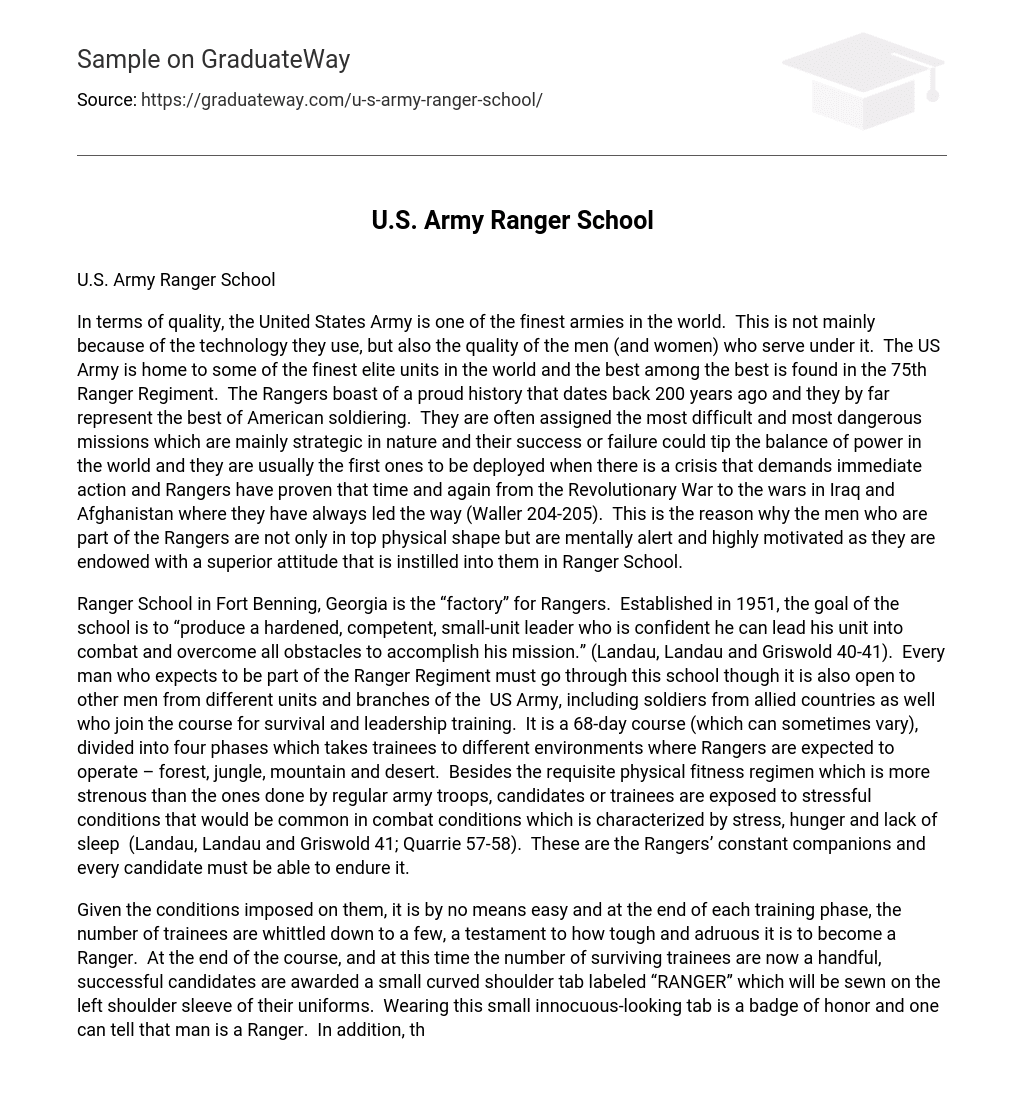In terms of quality, the United States Army is one of the finest armies in the world. This is not mainly because of the technology they use, but also the quality of the men (and women) who serve under it. The US Army is home to some of the finest elite units in the world and the best among the best is found in the 75th Ranger Regiment. The Rangers boast of a proud history that dates back 200 years ago and they by far represent the best of American soldiering. They are often assigned the most difficult and most dangerous missions which are mainly strategic in nature and their success or failure could tip the balance of power in the world and they are usually the first ones to be deployed when there is a crisis that demands immediate action and Rangers have proven that time and again from the Revolutionary War to the wars in Iraq and Afghanistan where they have always led the way (Waller 204-205). This is the reason why the men who are part of the Rangers are not only in top physical shape but are mentally alert and highly motivated as they are endowed with a superior attitude that is instilled into them in Ranger School.
Ranger School in Fort Benning, Georgia is the “factory” for Rangers. Established in 1951, the goal of the school is to “produce a hardened, competent, small-unit leader who is confident he can lead his unit into combat and overcome all obstacles to accomplish his mission.” (Landau, Landau and Griswold 40-41). Every man who expects to be part of the Ranger Regiment must go through this school though it is also open to other men from different units and branches of the US Army, including soldiers from allied countries as well who join the course for survival and leadership training. It is a 68-day course (which can sometimes vary), divided into four phases which takes trainees to different environments where Rangers are expected to operate – forest, jungle, mountain and desert. Besides the requisite physical fitness regimen which is more strenous than the ones done by regular army troops, candidates or trainees are exposed to stressful conditions that would be common in combat conditions which is characterized by stress, hunger and lack of sleep (Landau, Landau and Griswold 41; Quarrie 57-58). These are the Rangers’ constant companions and every candidate must be able to endure it.
Given the conditions imposed on them, it is by no means easy and at the end of each training phase, the number of trainees are whittled down to a few, a testament to how tough and adruous it is to become a Ranger. At the end of the course, and at this time the number of surviving trainees are now a handful, successful candidates are awarded a small curved shoulder tab labeled “RANGER” which will be sewn on the left shoulder sleeve of their uniforms. Wearing this small innocuous-looking tab is a badge of honor and one can tell that man is a Ranger. In addition, those who join the Ranger Regiment are indoctrinated in its creed which emphasizes that are expected to give it their all, never to surrender and to accomplish the mission regardless of the situation (Landau, Landau and Griswold 105). They do it simply because they are Rangers, if one were to ask them.
All in all, one can understand the character and ethos of the Ranger. Ranger School prepared them for that. Not only did it train and equip then with the best of American techonlogy, it also instilled in them a special attitude that exuces courage, confidence and determination. Rangers are expected to live by these or die trying. Being a Ranger is not a job, it is a way of life.
Works Cited
Army Ranger Mojo, Inc. Army Ranger Mojo Inc. 2010. 18 August 2010 <http://www.armyranger.com/>.
Landau, Alan, et al. U.S. Special Forces. Osceala, Wisconsin: MBI Publishing Company, 1999.
Quarrie, Bruce. Special Forces. London: New Burlington Books, 1990.
Stanton, Shelby. Soldiers: A Portrait of the United States Army. Charlottesville, Virginia: Howell Press, 1990.
Waller, Douglas. The Commandos. New York: Dell Publishing, 1994.





